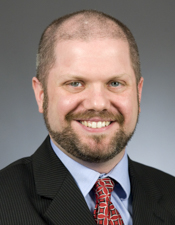Minnesotans with disabilities need more access to maintain physical fitness
Rob Wudlick fractured his spine in a diving accident while on a river rafting trip in 2011. When he was released from inpatient physical therapy four months later, his ability to move was limited to shrugging his shoulders.
By participating in fitness programs offered by the Courage Kenny Rehabilitation Institute three days a week, Wudlick was able to immediately improve his blood pressure, core strength, and mood. Over time, he also began regaining functional abilities as well and is able to use a joystick-operated wheelchair.
But there’s always a catch.
“It’s really hard for somebody in a situation like mine to be able to afford access to this,” he told the House Health and Human Services Policy Committee Friday.
HF1166, sponsored by Rep. Mike Freiberg (DFL-Golden Valley), would appropriate $2 million in Fiscal Year 2020 for a grant program intended to improve access to fitness opportunities for people with disabilities.
The bill was approved, as amended, by the committee and referred to the House Ways and Means Committee.
A companion, SF1312, is sponsored by Sen. John Hoffman (DFL-Champlin) and awaits action by the Senate Human Services Reform Finance and Policy Committee.
“All of us benefit from exercise. That includes people living with disabilities,” Andy Rapacz, an exercise physiologist at the Courage Kenny Rehabilitation Institute, said.
Physical activity can improve cardiovascular health, blood pressure, strength, and stamina. For people with disabilities, it can also improve sensation and muscle control, help with bladder, bowel, and sexual function, and minimize the risk of other conditions associated with immobility, he said.
That can mean major improvements in someone’s quality of life and long-term health outcomes. But people with disabilities “cannot just go into any gym,” and require specialized equipment, trained staff, and additional room to maneuver in walkers or wheelchairs, Rapacz said.
There are only four adaptive fitness centers in Minnesota: Courage Kenny facilities in Minneapolis, Stillwater, and Edina, and ExercisAbilities Inc. in Rochester, he said.
Grant funding could support initiatives to establish centers in Duluth and St Cloud, as well, said Melanie Brennan, executive director and founder of ExercisAbilities.
Most people seeking access to these adaptive fitness services no longer have skilled physical therapy coverage through their insurance companies, so the programs are not supported through insurance money, she said.
ExercisAbilities tries to keep barriers to a minimum and serves more than 200 people a year, but hundreds more in the Rochester area could benefit and state support would help to defray the cost, Brennan said.
The bill would require the Department of Human Services to prepare a report for the Legislature with information on how the funding was used, plans for the long-term sustainability of funded projects, and outcomes.
Related Articles
Search Session Daily
Advanced Search OptionsPriority Dailies
Ways and Means Committee OKs proposed $512 million supplemental budget on party-line vote
By Mike Cook Meeting more needs or fiscal irresponsibility is one way to sum up the differences among the two parties on a supplemental spending package a year after a $72 billion state budg...
Meeting more needs or fiscal irresponsibility is one way to sum up the differences among the two parties on a supplemental spending package a year after a $72 billion state budg...
Minnesota’s projected budget surplus balloons to $3.7 billion, but fiscal pressure still looms
By Rob Hubbard Just as Minnesota has experienced a warmer winter than usual, so has the state’s budget outlook warmed over the past few months.
On Thursday, Minnesota Management and Budget...
Just as Minnesota has experienced a warmer winter than usual, so has the state’s budget outlook warmed over the past few months.
On Thursday, Minnesota Management and Budget...
